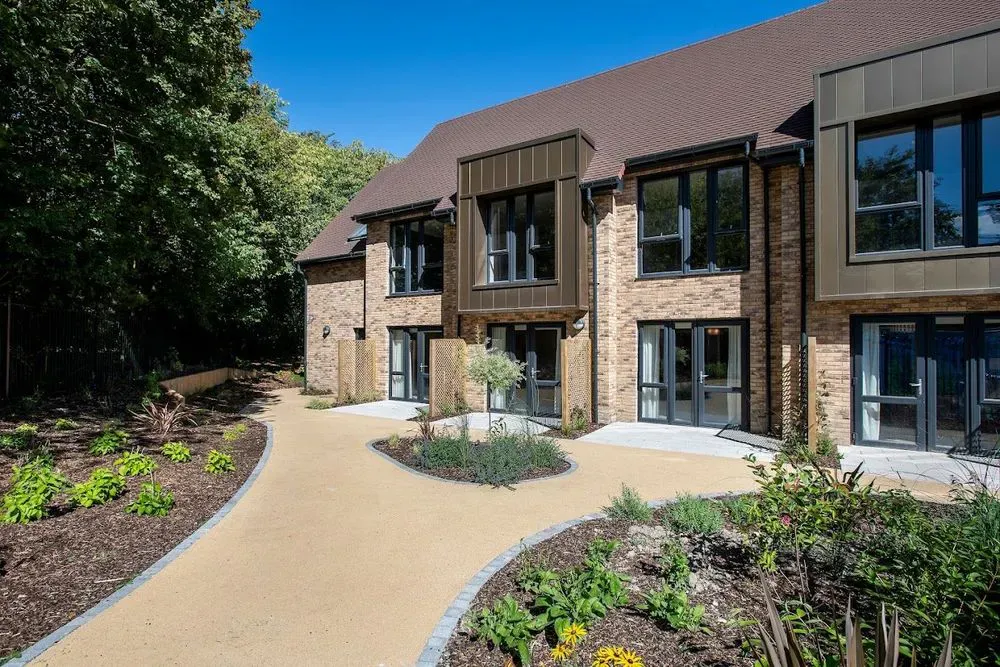When Should Someone With Dementia Go Into a Care Home?

Estimated Reading Time: 11 minutes
There are lots of reasons why people living with dementia move into dementia care homes. Your loved one’s care requirements may have changed, meaning you or other family members can no longer provide the care they need to keep them safe in their own home.
This article discusses when someone with dementia should go into a care home, including who makes this decision, signs to look out for, getting a dementia diagnosis and creating a dementia care plan.
Need to find dementia care fast?
Browse the best dementia care homes for your loved one.
In this article:
- When should someone with dementia go into a care home?
- Who makes the decision for someone with dementia to go into a care home
- Signs that a dementia care home may be needed
- What to do if your loved one with dementia refuses to go into a care home
- How to get a dementia diagnosis
- Creating a dementia care plan
- Paying for dementia care
- The benefits of dementia care homes
- Help your loved one settle into their new surroundings
When Should Someone With Dementia Go Into A Care Home
There are a few reasons why somebody living with dementia might move into a care home, such as:
Safety concerns - Your loved one is no longer safe living by themselves, due to wandering or forgetfulness. They may also be unable to manage daily tasks such as eating and taking any medication
Increased care needs - You, other family members, friends or a home carer feel as though you’re no longer able to provide enough care for them, keep them safe or meet their personal care needs (even if you were previously able to). They may now require 24/7 supervision, which a care home can provide through dementia care specialists and skilled nurses. Their needs may have gradually increased (dementia is a cognitive condition so care requirements are likely to grow over time) or suddenly increased (they may have had an accident which has caused the amount of care they require to suddenly heighten)
Caregiver burnout - It’s common for family caregivers to experience emotional and physical strain when providing care to a loved one. When experiencing caregiver burnout, you may feel as though you’re no longer able to properly care for your loved one
Social isolation - A care home provides a friendly and social environment if your loved one is experiencing social isolation and loneliness at home
When the above applies, your loved one would likely be safer and more fulfilled in a dementia care home than they would be continuing to live at home.
Previously, your loved one may have only needed help with daily living tasks such as household chores which you could have helped with, but their dementia has now moved beyond this point, so specialist care is required to keep them safe.
Your loved one may have also started wandering, so a secure environment is also needed for their safety.
If you aren’t sure whether a dementia care home is the best option, it can be helpful to write a list of your loved one’s needs and whether you can adequately meet them. If you find that there are a lot of items on the list where you don’t feel you can provide proper long-term care and support, it’s probably the right time to begin considering options such as a care home.
Who Makes The Decision For Someone With Dementia To Go Into A Care Home?
The person living with dementia may be able to decide for themselves whether they enter a care home. They should do this where possible. However, they may still need support from you or other family members to make this decision.
It’s common that people living with dementia have lost ‘mental capacity’, meaning they’re no longer able to make decisions for themselves. You can ask your loved one’s doctor or a different healthcare professional to assess their mental capacity.
If they’re assessed as no longer having mental capacity, somebody must decide on their behalf, such as their attorney under a Lasting Power of Attorney (LPA). This is often a family member such as a child or other relative.
A healthcare professional such as a physician or your loved one’s GP can also provide valuable input by advising on whether or not they feel full-time dementia care is required.
Staff at a potential care home can provide valuable insights into the level of care they can offer, helping you to better understand the available options.
Whoever makes the decision must always keep the best interests of the person living with dementia in mind.

Signs That A Dementia Care Home May Be Needed
The following are common dementia symptoms. If your loved one is experiencing several of these, they may need dementia care (or more advanced dementia care):
- Forgetting recent events
- Misplacing items
- Finding it more difficult to complete everyday tasks
- Increased confusion and a lack of concentration
- Sudden mood swings
- Withdrawing from others and social situations in general
You should also consider the following things to understand better how dementia is affecting your loved one:
- Do they regularly wander?
- Do they have limited mobility?
- Would their home need lots of adaptations for them to remain safe in it?
With the above in mind, you can note any changes to your loved one’s behaviour, as this may indicate whether their dementia is progressing beyond the early stages. You can ask neighbours, close family and anyone else who regularly sees your loved one to do the same, and let you know of any changes or noteworthy behaviour they spot.
What To Do If Your Loved One With Dementia Refuses To Go Into A Care Home
If your loved one has dementia but is still of sound mind and can look after themselves, they can’t be forced to move into a care home if they don’t want to. At this point, it’s their own decision.
If they’re classed as not having the capacity to make decisions regarding their care, medical professionals such as doctors will work with family members to make a decision that’s in your loved one’s best interests.
If your loved one doesn’t want to move into a care home, they may become agitated or unhappy. This is perfectly normal. It’s important to clearly explain why a care home would be best for them and that regardless of where they live, you’ll always be there for them.
How To Get A Dementia Diagnosis
Healthcare professionals give several tests and scans to diagnose dementia.
The assessment process will vary from person to person, but the standard steps to getting a diagnosis are:
A healthcare professional (this is often your loved one’s GP) will carry out an assessment in addition to a care needs assessment. Depending on their findings, they may then refer you to a memory clinic with specialist dementia staff
Your loved one will have their potential memory loss assessed and diagnosed at this memory clinic. They may also have a scan to check for any changes to their brain and to see how it now operates
Depending on the results from step 2, treatment options and additional support will be offered, including a detailed care plan

Creating A Dementia Care Plan
A dementia care plan will explain exactly how somebody living with dementia can be best cared for.
Your loved one will be given a dementia plan when it’s decided that dementia care is the best option, such as in a dementia care home.
This plan should include:
Personal preferences - What your loved one enjoys doing on a daily basis. The foods and drinks they do and don’t enjoy should also be mentioned
Daily routine - The times your loved one likes to get up and go to sleep, when they like to eat, when they like doing certain activities and so on
Specialist care needs - The specific care your loved one needs, along with any specialist medication and treatment required that would need to be given by a registered nurse
Personal care needs - Daily tasks your loved one requires assistance with, including washing, getting dressed and undressed, getting in and out of bed and anything else relating to personal hygiene
A dementia care plan helps carers and other members of staff better understand your loved one’s history and how to care for them.
Paying For Dementia Care
A care needs assessment will determine whether your loved one requires dementia care. This isn’t necessary if you already know what sort of care they need, but it is required to get a financial assessment, as this immediately follows a care needs assessment.
A financial assessment will determine whether your loved one has to pay for their own dementia care or if they’ll qualify for full or partial funding support from their local council. This will depend on the total value of their savings and income (and assets if they go into a dementia care home).
Unless they qualify for local authority funded support or NHS continuing healthcare, people living with dementia have to pay for their own care. Your loved one could also qualify for NHS-funded nursing care if they aren’t eligible for NHS continuing healthcare.
Our 2024 Care Seeker Survey found that the proportion of people who use personal savings to pay for their own care has significantly increased since 2021, from 41% to 65%. This was most apparent in England, where funding thresholds are the least generous to care seekers.
The average weekly cost of self-funded care in the dementia care homes we list is:
- England - £1,450 for residential dementia care and £1,604 for nursing dementia care
- Scotland - £1,460 for residential dementia care and £1,568 for nursing dementia care
- Wales - £1,258 for residential dementia care and £1,400 for nursing dementia care
For more information, we have an article explaining care home costs throughout the UK.
The Benefits Of Dementia Care Homes
- Peace of mind for residents and their loved ones
- Round-the-clock care is available in a safe and friendly environment
- Your loved one will have the chance to meet other similarly-aged residents going through similar experiences. This time can be spent in communal areas and taking part in fun social activities such as gardening (often in a sensory garden), painting and singing
- The security offered by dementia care homes will help prevent wandering
- Food menus can be tailored to the preferences and dietary requirements of individual residents
- You can visit your loved one in their brand-new home as often as you wish
Help Your Loved One Settle Into Their New Surroundings
Many people living with dementia are nervous to move from their current surroundings to a care home.
You can help reduce any anxiety your loved one is experiencing by making sure their new room has personal touches of sentimental value, such as family photos, blankets and other treasured possessions.
Often, having a staff member present who your loved one has previously met can provide some much-needed reassurance when moving in.
Some care homes offer trial periods as well. In this case, your loved one can temporarily move into a care home, before a decision is made about whether they’ll move in on a full-time basis.
We Can Help You Find Dementia Care
You can get in touch with our team of friendly and knowledgeable care experts, who will help you find a dementia care home or home care service near you.
Find a dementia care home
We’ve partnered with the best dementia care homes across the UK, which have state-of-the-art facilities for people living with dementia like sensory gardens, secure doors and colour-coded rooms.
Caring for somebody with dementia at home
We’re also partnered with the country’s best home care providers.
These providers offer a range of services, including domiciliary, live-in and overnight care, with these services often including specialist dementia support.
You can use our free service to search for early-stage dementia home care, late-stage dementia home care and Alzheimer’s home care.
Click the home care providers link above and enter your postcode to see which providers offer care in your area and what kinds of care they offer.
Loading FAQs...



